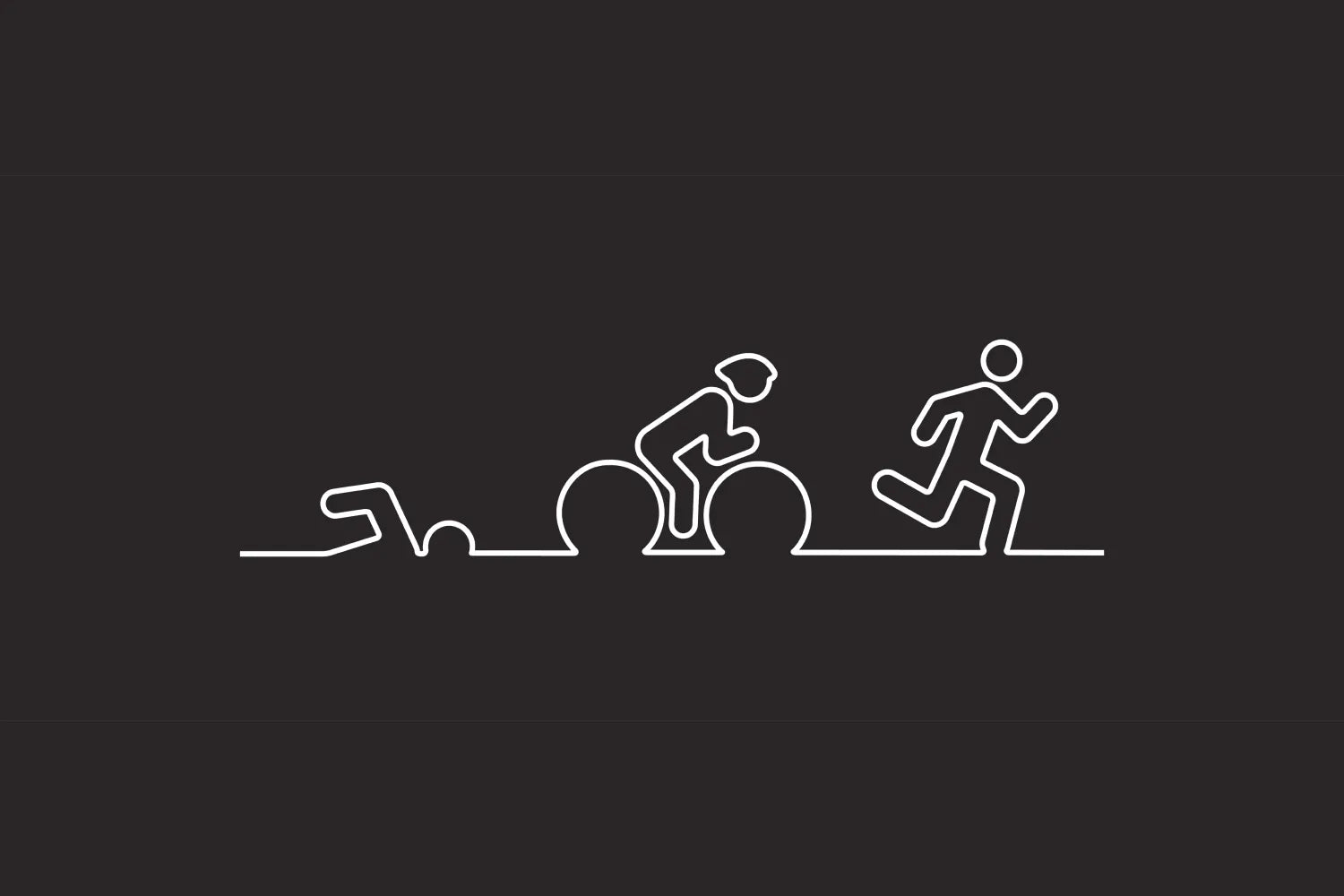
The Ironman Triathlon is more than a race. It's an example of human endurance, a battle of willpower, and an experience that pushes athletes to their physical and mental limits. This event, comprising a 2.4-mile swim, a 112-mile bike ride, and a 26.2-mile run, requires immense preparation and resilience.
At Copper Fit, we align with the spirit of this extraordinary challenge. Our mission is to support athletes in their pursuit of excellence, to help them train effectively, recover faster, and perform at their best.
What Is the Ironman Triathlon?
An Ironman Triathlon is one of the most demanding single-day sporting events in the world. It begins with a 2.4-mile open-water swim, followed by a 112-mile bicycle ride, and concludes with a full marathon run of 26.2 miles.
All of this must be completed within 17 hours. The event's name, "Ironman," truly encapsulates the iron will and strength required to complete such a feat. The physical challenges involved are immense.
Athletes must have exceptional stamina, strength, and endurance to successfully complete each segment of the race. It's not only about being able to swim, cycle, or run the required distances; it's about doing all three back-to-back, with transitions in between that add another layer of complexity to the event.
Challenges of the Ironman
Each segment of the race presents its unique challenges.
- The open water swim requires athletes to navigate through a mass start and potentially rough waters.
- The bike ride, usually held on challenging, hilly courses, tests the athletes' strength and endurance.
- The marathon, run after hours of continuous physical exertion, is a true test of an athlete's mental toughness and resilience.
Mental fortitude is equally crucial, as the race tests the body but also the mind's ability to remain focused, motivated, and resilient in the face of fatigue. The path to becoming an Ironman is as much a mental challenge as it is a physical one.
It's about pushing your limits, overcoming obstacles, and proving to yourself that you have the strength and determination to complete one of the toughest endurance events in the world.
Why Is It Important To Train for the Ironman?
Training for an Ironman Triathlon is a commitment that demands time, effort, and a well-planned strategy. Proper training is essential to build the endurance needed for the race and to avoid potential injuries that could result from extreme physical exertion.
Inadequate preparation can lead to a range of issues, from physical injuries to exhaustion and poor performance on race day. Therefore, a comprehensive training plan that includes physical conditioning, injury prevention, and recovery is crucial.
Compression socks and compression sleeves can help support blood circulation to your joints and muscles, providing comfort and aiding recovery. Don’t forget that every step of your training should be geared toward ensuring that you reach the starting line in the best shape possible, both physically and mentally.
Training for Each Component: Swimming, Cycling, Running
Training for an Ironman Triathlon means preparing for three different disciplines, each with its own set of challenges.
Swimming
Swimming 2.4 miles in open water requires strength, endurance, and technique. Incorporating a mixture of long swims, speed drills, and technique work into your training can help improve your efficiency in the water.
Copper Fit's compression gear can assist during recovery periods, soothing muscle soreness and helping you bounce back for your next swim session.
Cycling
The 112-mile bike ride is the longest segment of the race. Building your endurance through long, steady rides is crucial. Interval training can also help improve your speed and power. Wearing compression sleeves during your rides can provide additional support to your joints and muscles, helping to prevent strain and fatigue.
Running
Completing a full marathon after swimming and cycling is a true test of endurance. Long runs should form the backbone of your running training—but don't neglect speed work and hill training.
Recovery and Injury Prevention
Recovery is an essential part of training for an Ironman Triathlon. Your body needs time to heal and adapt to the increased training load. Incorporating rest days into your training schedule, getting plenty of sleep, and nourishing your body with healthy foods are all crucial for recovery.
Injury prevention is equally important. Overuse injuries are common in triathlon training due to the repetitive nature of the exercises.
As with any training program, it's important to listen to your body and adjust your training load as needed to prevent injuries. If you experience persistent pain or discomfort, it's important to seek professional medical advice.
Nutrition and Hydration
Training for an Ironman Triathlon is as much about fueling your body correctly as it is about physical training. Proper nutrition and hydration are crucial for maintaining energy levels, supporting recovery, and maximizing performance.
A balanced diet rich in carbohydrates, proteins, and healthy fats can provide the necessary fuel for your training sessions and aid in muscle recovery and repair. Hydration is equally important, particularly during long training sessions. Dehydration can lead to fatigue, decreased performance, and serious health complications.
While training, it's essential to practice your nutrition and hydration strategy for race day. Experiment with different foods and hydration options during your long training sessions to find out what works best for you. Don’t forget that what you put into your body can significantly affect your performance and recovery.
Mental Preparation
The Ironman Triathlon is more than just a physical challenge; it's a significant mental one, too. Preparing your mind for the race is just as important as training your body. The mental fortitude required to push through the physical discomfort and maintain focus during such a grueling event cannot be understated.
Positivity
Mental toughness, resilience, and a positive mindset can significantly influence your performance. Visualization techniques can be a powerful tool in your mental training. By visualizing each stage of the race, you can mentally prepare for the challenges ahead and build confidence in your ability to overcome them.
Setting Goals
Goal setting is another essential aspect of mental preparation. Having clear, achievable goals can provide motivation during your training and keep you focused on race day. Don’t forget to set both short-term goals (like improving your swim technique or increasing your cycling speed) and long-term goals (like completing the race within a specific time).
Self-Talk
Positive self-talk can also help build mental strength. The way you talk to yourself can have a significant impact on your mindset and performance. Encourage yourself, celebrate your progress, and maintain a positive attitude even when training gets tough.
Completing an Ironman Triathlon is as much about believing you can do it as it is about physical preparation. With the right mindset, you'll be well-equipped to take on the challenge of the Ironman Triathlon. Mental strength, after all, is a muscle that needs training just as much as the physical ones, and with consistent training, it will carry you through to the finish line.
Crossing the Finish Line
Training for an Ironman Triathlon tests your physical endurance and mental strength. It requires meticulous preparation, from understanding the demands of the race to tailoring your training for each component, prioritizing recovery, preventing injuries, and ensuring proper nutrition and hydration.
Copper Fit offers products designed to support your training, promote recovery, and help soothe any discomfort. Our compression gear can provide the necessary support during your intense training sessions and aid in recovery.
While your physical preparation is crucial, don't underestimate the power of mental strength. Cultivate resilience, determination, and a positive mindset as you gear up for the race.
If your discomfort persists despite these strategies, it may be time to consult a healthcare professional for a more personalized treatment plan. At Copper Fit, our mission is to support your comfort and recovery, empowering you to stay active and feel your best every day.
As you embark on this Ironman Triathlon saga, keep in mind that every step, every mile, and every moment of training brings you closer to achieving your goal. We're with you all the way.
Sources:
Cross Training – what it is and why we should do it. | Recreation | Georgetown University
How Runners Can Use Psychology to Achieve Success | Counseling@Northwestern
Eat Like an Olympian: Fuel Your Performance with the Right Nutrition | University of Utah Health
Want to become a better runner? Tips to step up your performance, prevent injuries





